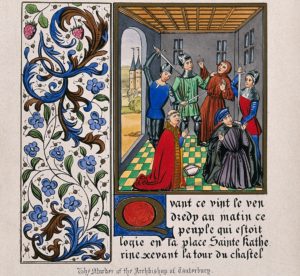Episode 2: Medieval Murder and the Birth of Manslaughter
Welcome to our first fully historical episode of the History of Murder Podcast!
In today’s episode, we look back at the history of murder law in medieval England. We’ll see a major problem with it: there’s only one punishment for all kinds of killing, and that punishment is death. Do we really want to punish everyone who kills someone else with death? Is it fair to punish everyone in the same way? Don’t we want to punish the serial killer more than we want to punish the random person who killed someone during a bar fight? These problems give rise to the birth of manslaughter, but not before we take a detour through one of the weirdest concepts in the common law, benefit of clergy.

The murder of Archbishop Thomas Becket in Canterbury Cathedral. Not only a classic medieval murder, but a pivotal one for the development of manslaughter (via benefit of clergy).
Sources
In this episode, I rely heavily on the following article by Thomas Green and take the Walter and Thomas example from it. Note that their case is a mere footnote in this enormous and very rich article!
Thomas A. Green, “The Jury and the English Law of Homicide, 1200-1600,” Mich. L. Rev. 74 (1976): 413-99. Available for download here.
You can find John Salisbury’s case reported by Plowden in The Commentaries, Or Reports of Edmund Plowden, Containing Divers Cases Upon Matters of Law, Argued and Adjudged in the Several Reigns of King Edward VI., Queen Mary, King and Queen Philip and Mary, and Queen Elizabeth [1548-1579] (Part 1), available here on Google books (pp 100-101 of the original text, but note the strange pagination).
For a great overview of benefit of clergy and the early years of manslaughter, check out the introductory chapter to Kesselring, K. J. 2019. Making Murder Public : Homicide in Early Modern England, 1480-1680 (version First edition.) First ed. Oxford: Oxford University Press.